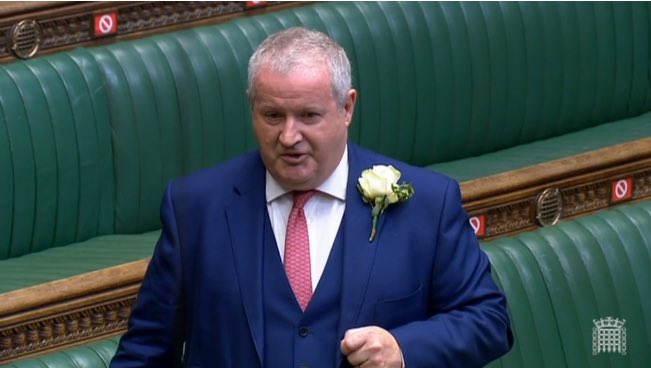Anyone paying close attention to television coverage of the King’s Speech on Tuesday may have noticed that SNP MPs in attendance looked as if their next appointment was a wedding reception, with white roses on their lapels. In fact, the Nats wear the rose in honour of poet Hugh MacDiarmid, a founder of the National Party of Scotland which merged with the Scottish party in 1934, creating the SNP.
The nationalists’ boutonnière references MacDiarmid’s poem ‘The Little White Rose’, a drab little celebration of the sort of insularism the SNP insists doesn’t exist within its brand of nationalism. If you think my critique harsh, judge for yourself:
‘The rose of all the world is not for me. / I want for my part / Only the little white rose of Scotland / That smells sharp and sweet—and breaks the heart.’
MacDiarmid’s petty little verse is the poetic equivalent of a great aunt’s lament that she hears lots of eastern European accents on the bus, or a grandpa’s refusal to eat food ‘with bits in it’. The SNP expends a great deal of energy insisting its is an outward looking, civic nationalism. It talks of the need to rejoin the EU and play a leading role on the world stage. It’s strange, then, that the party should so revere a poem which encapsulates Scottish chippiness.

The SNP small man complex familiar to us Scots manifests itself in ways both exhausting and entertaining. Throughout the rise to sporting greatness of Sir Andy Murray, for example, one was never far away from a bore who’d tell you — without evidence, for none existed — that, as far as the big bad BBC was concerned, he was Scottish when he was losing and British when he was winning.
My favourite example of this hair-trigger defensiveness involves a poetry reading some years ago in the public library in the Aberdeenshire town of Banchory. The guest, a fellow from Brighton, explained that his next poem was inspired by watching lizards dart around the pier in his home town. ‘You probably don’t get many lizards up here,’ he told the audience. ‘We’ve got plenty of lizards, son,’ snapped a woman in the front row.
Even if ‘The Little White Rose’ were not such a miserable piece, the SNP’s reverence of MacDiarmid is baffling for other reasons.
The poet — real name, Christopher Murray Grieve — was quite the crank. During his lifetime, he flirted with both fascism and Stalinism. In letters, discovered in 2010, MacDiarmid suggested that Nazi rule in Britain might be preferable to the UK government at the time. In one missive, sent to fellow poet Sorley MacLean in April 1941, MacDiarmid wrote: ‘On balance I regard the Axis powers, though more violently evil for the time being, less dangerous than our own government in the long run and indistinguishable in purpose.’
The previous June, he wrote: ‘Although the Germans are appalling enough, they cannot win, but the British and French bourgeoisie can and they are a far greater enemy. If the Germans win they could not hold their gain for long, but if the French and British win it will be infinitely more difficult to get rid of them.’
Perhaps more unpleasant still is another MacDiarmid poem, unpublished in his lifetime and discovered in the archives of the National Library of Scotland some 20 years ago. In the piece, entitled ‘On the Imminent Destruction of London, June 1940’, MacDiarmid wrote:
‘Now when London is threatened / With devastation from the air / I realise, horror atrophying in me, / That I hardly care.’
So perhaps the Nats should rethink their continued use of the flowers. While beautiful to the eye, the SNP’s white roses represent something far uglier.







Comments